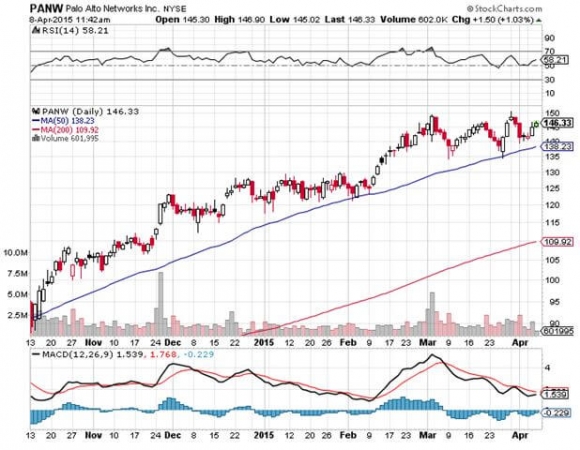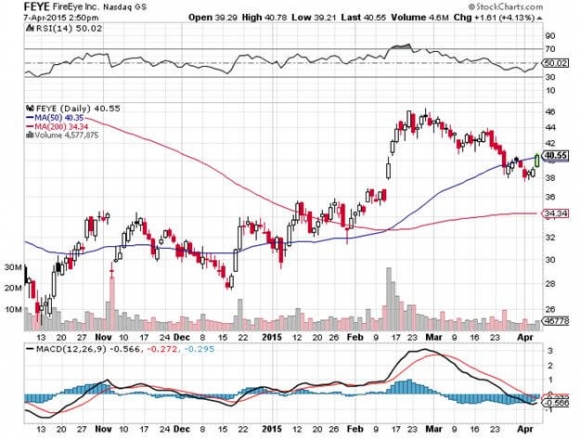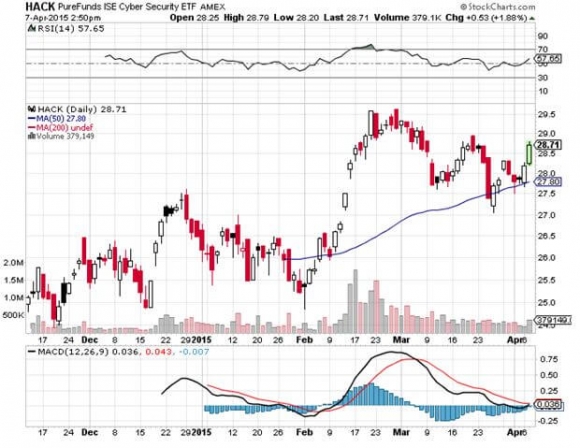Follow Up to Trade Alert - (PANW) April 8, 2015
As a potentially profitable opportunity presents itself, John will send you an alert with specific trade information as to what should be bought, when to buy it, and at what price. This is your chance to ?look over? John Thomas? shoulder as he gives you unparalleled insight on major world financial trends BEFORE they happen.
Follow Up to Trade Alert - (PANW) - UPDATE
Buy the Palo Alto Networks (PANW) May, 2015 $125-$135 deep in-the-money vertical call spread at $8.60 or best
Opening Trade
4-8-2015
expiration date: May 15, 2015
Portfolio weighting: 10%
Number of Contracts = 12 contracts
It looks like the cyber security sector, one of the best market performers so far in 2015, is about to take off like a rocket once again.
You can buy this vertical bull call spread anywhere within a $8.50-$9.25 range and have a reasonable expectation of making money on this trade by the May 15 expiration. If you can?t do options, then buy the stock outright. There could be another 25%-50% in it this year.
The near destruction of Sony (SNE) by North Korean hackers last November has certainly put the fear of God into corporate America. Apparently, they have no sense of humor whatsoever north of the 38th parallel.
As a result, there is a generational upgrade in cyber security underway, with many potential targets boosting spending by multiples.
It?s not often that I get a stock recommendation from an army general. That is exactly what happened the other day when I was speaking to a three star about the long-term implications of the Iran peace deal.
He argued persuasively that the world will probably never again see large-scale armies fielded by major industrial nations. Wars of the future will be fought online, as they have been silently and invisibly over the past 15 years.
All of those trillions of dollars spent on big ticket, heavy metal weapons systems are pure pork designed by politicians to buy voters in marginal swing states. The money would be far better spent where it is most needed, on the cyber warfare front. Needless to say, my friend shall remain anonymous.
The problem is that when wars become cheaper, you fight more of them, as is the case with online combat.
You probably don?t know this, but during the Bush administration, the Chinese military downloaded the entire contents of the Pentagon?s mainframe computers at least seven times. This was a neat trick because these computers were in stand alone, siloed, electromagnetically shielded facilities not connected to the Internet in any way.
In the process, they obtained the designs of all of out most advanced weapons systems, including our best nukes. What have they done with this top-secret information?
Absolutely nothing.
Like many in senior levels of the US military, the Chinese have concluded that these weapons are a useless waste of valuable resources. Far better value for money are more hackers, coders and servers, which the Chinese have pursued with a vengeance.
You have seen this in the substantial tightening up of the Chinese Internet through the deployment of the Great Firewall, which blocks local access to most foreign websites.
Try sending an email to someone in the middle Kingdom with a Gmail address. It is almost impossible. This is why Google (GOOG) closed their offices there years ago.
As a member of the Joint Chiefs of Staff recently told me, ?The greatest threat to national defense is wasting money on national defense.?
Although my brass hatted friend didn?t mention the company by name, the implication is that I need to go out and buy Palo Alto Networks (PANW) right now.
Palo Alto Networks, Inc. is an American network security company based in Santa Clara, California just across the water from my Bay area office. The company?s core products are advanced firewalls designed to provide network security, visibility and granular control of network activity based on application, user, and content identification.
Palo Alto Networks competes in the unified threat management and network security industry against Cisco (CSCO), FireEye (FEYE), Fortinet (FTNT), Check Point (CHKP), Juniper Networks (JNPR), and Cyberoam, among others.
The really interesting thing about this industry is that there really are no losers. That?s because companies are taking a layered approach to cyber security, parceling out contracts to many of the leading firms at once, looking to hedge their bets.
To say that top management has no idea what these products really do would be a huge understatement. Therefore, they buy all of them.
This makes a basket approach to the industry more feasible than usual. You can do this through buying the $435 million capitalized PureFunds ISE Cyber Security ETF (HACK), which boasts Cyberark Software (CYBR), Infoblox (BLOX), and FireEye (FEYE) as its three largest positions. (HACK) has been a hedge fund favorite since the Sony attack.
For more information about (HACK), please click here at http://www.pureetfs.com/etfs/hack.html.
The best execution can be had by placing your bid for the entire spread in the middle market and waiting for the market to come to you. The difference between the bid and the offer on these deep in-the-money spread trades can be enormous.
Don?t execute the legs individually or you will end up losing much of your profit. Spread pricing can be very volatile on expiration months farther out.
If the price of this spread has moved more than 5% by the time you receive this Trade Alert, don?t chase it. Wait for the next one. There are plenty of fish in the sea.
Here are the specific trades you need to execute this position:
Buy 12 May, 2015 (PANW) $125 calls at?????$21.75
Sell short 12 May, 2015 (PANW) $135 calls at..??.$13.15
Net Cost:??????????????????.....$8.60
Potential Profit: $10.00 - $8.60 = $1.40
(12 X 100 X $1.40) = $1,680 or 1.68% profit for the notional $100,000 portfolio.









